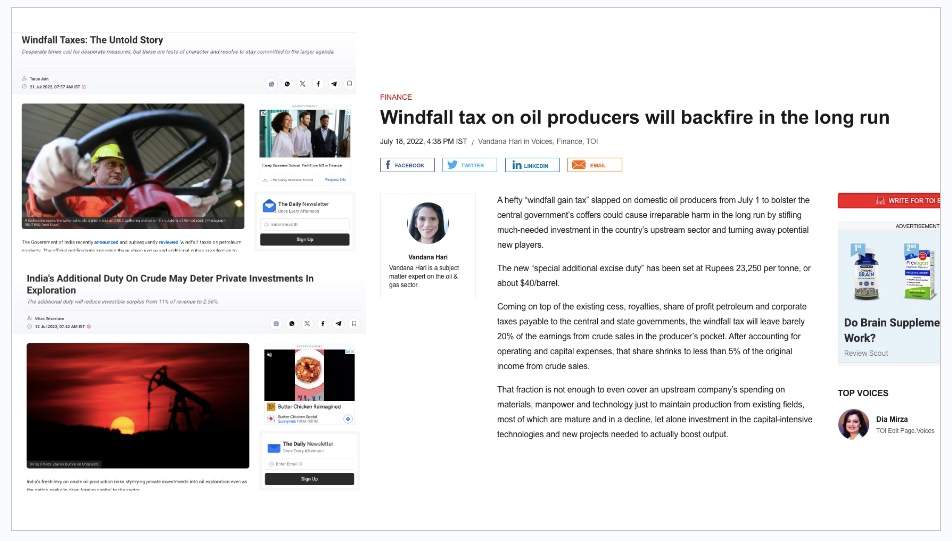Tax advocacy case study
Situation & Challenge
The Indian government introduced Special Additional Excise Duty (SAED) on crude oil in July 2022. This 'windfall tax' added on to the ~70% taxes that oil and gas exploration and production (E&P) companies in the country already redirect to the government exchequer in the form of royalty, cess and profit petroleum. This tax rate in India is significantly higher than the global average where E&P companies shell 30-40% of their income as tax. Further, India remains heavily import dependent - with ~85% of its energy coming at a foreign heavy cost. This is not healthy for an economy that is seeking to achieve energy self-sufficiency by 2047. Further, the new SAED was denting business and constricting the sector which had already been struggling with an overburdening tax regime. Finally, this is even more challenging as oil and gas companies in developing countries are now required to pump investments into adopting more sustainable practices in their operations to achieve the dual goal of energy security in tandem with energy transition. The tax regime was making these goals unviable but expectations to perform loomed large and strong.
Our goal was to drive advocacy for Company X (cannot disclose name under NDA), an oil and gas E&P company in India, whose business was being severely impacted by the burgeoning tax slabs.
Challenge: We cannot openly dismiss the tax regime and share thoughts that oppose government decisions as Company X works closely with the government and remains dependent on it for contract extensions. Duly, outright rebellion or even open vocalization of challenges was not the desirable path.
Solution
We opted to collaborate with third-party influencers and senior editors who were better equipped to discuss the issue on our behalf. We approached oil and gas experts whose subject expertise lent credibility to our business concerns. The messaging was developed closely with these experts to showcase the challenge through robust numbers and results that highlight how oddly India’s domestic crude oil and gas sector is placed in comparison to the rest of the world. We maintained a momentum of ensuring bi-monthly media stories.
The goal was to keep rolling conversations and ensure that the topic remains fresh in memory. This encouraged conversations on India's detrimental tax regime and helped maintain tacit pressure on the government. Simultaneously, the business team continued working closely with the government through industry fora, back-door meetings and other collaborative platforms.
We significantly increased media mentions of the keywords 'SAED' and 'windfall tax on crude'. The Government was compelled to recognize the voices of dissent and reconsider SAED which was reduced across different meetings. All of this while ensuring anonymity, safeguarding reputation and maintaining strong government ties.
Over 30
articles published
Over 10
Third-party influencers engaged
100% increase
Mentions of 'windfall tax' in media stories
